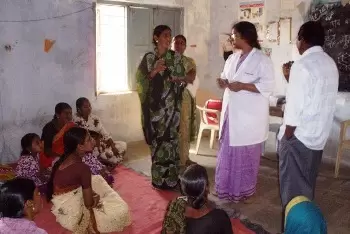Now, allegations surface of forced hysterectomies

06-March-2013
Vol 4 | Issue 9
Consider this chilling statistic: In the last two years, in various states of India, more than 30,000 women were reported to have undergone hysterectomies. In 2011, 16,000 women opted for hysterectomies in Bihar; doctors performed about 7,000 uterus removal surgeries over a period of 30 months in Chhattisgarh, while a total of 11,000 such procedures were done over a period of two years in Andhra Pradesh.
Not only is this sudden rise in hysterectomies deeply worrying, even more serious is the fact that 80 per cent of the women who underwent them were between the ages of 20 and 40 years.
 |
|
Dr. Kameswari(in pic) has been campaigning against the unnecessary hysterectomies (Swapna Majumdar WFS)
|
Health activists contend that rural women living below the poverty line (BPL) are being advised to go under the knife to avail of their health insurance money provided under the Rashtriya Swasthya Bima Yojna (RSBY), the union government's premier insurance scheme that provides health coverage to underprivileged families.
According to reports, in Bihar's Samastipur district alone, 14,851 BPL women were admitted to 16 private hospitals in the past one year to avail the benefits under the RSBY scheme. In Chhattisgarh, private nursing homes billed the state government Rs 2 crore under the scheme for conducting hysterectomies of 1,800 women over a period of eight months last year.
In Andhra, under the Aarogyasri scheme, the state health insurance plan, a sum of Rs 2.9 crore was paid for 656 surgeries carried out in 2009-10.
According to Sulakshana Nandi of the Jan Swasthya Abhiyan, a collective of over a thousand NGOs working on health rights, "The RSBY and similar health insurance schemes are incentivising unethical practices leading to the large number of irrational and unnecessary surgeries."
Here's why health activists are concerned. Under the RSBY, cashless insurance of Rs 30,000 is given yearly to a BPL family – and a doctor can charge a hefty Rs 12,500 for a hysterectomy. In Andhra, for instance, a hysterectomy can cost up to Rs 60,000 - an amount that was reimbursed under the state's Aarogyasri scheme.
Nandi, who has done four studies assessing the implementation of the RSBY in Chhattisgarh, points out that private hospitals were cherry picking the patients they wanted to treat. "Doctors chose patients who needed high-end surgeries that are more expensive and, therefore, more profitable.
For example, a hysterectomy is considered a more profitable surgery compared to a caesarean section. It is ironic and scary that a woman can, in some sense, have easier access to hysterectomy than simple treatment for her problems at an early stage of any uterine infection because of RSBY and other insurance schemes," she contends.
In Andhra Pradesh, 'aarogyamitras', or health helpers, are appointed by private hospitals to scout around for patients who can be enticed to get operated upon in private hospitals, reveals N. Purendra Prasad of the Department of Sociology at Hyderabad University.
Prasad, along with research scholar P. Raghavendra, found that "a spurt in unnecessary surgeries had been reported after Aarogyasri was launched. For instance, in district Warangal's 13 private and five government hospitals, 38,090 cases, of which 3,346 operations related to hysterectomy, were reported from August 1, 2008 to August 21, 2010. As there was scope for quick money to be made in surgeries, private hospitals used registered medical practitioners (RMPs) to refer poor women with gynaecological problems as hysterectomy cases".
Unfortunately, it is the women who are ultimately paying a very heavy price. When Rajamma of Kannaram village in Andhra's Medak district went to the doctor complaining of pain in her lower abdomen, she was wheeled in for a hysterectomy. All she was told was that this would help relieve her pain. Rajamma was just 20.
But it was not just Rajamma who went under the knife. Almost all the women in Kannaram village had undergone hysterectomy for routine complaints like abdominal pain or white discharge. This was revealed by the Centre for Action, Research and People's Development (CARPED), a Hyderabad-based NGO.
The 2009 survey found that most of the women in the 125 households in the village had undergone procedures to remove their uterus. This was backed up by a study in the same year by the Andhra Pradesh Mahila Samatha Society, a state government organisation, which found hysterectomy cases in women between the ages 25 and 40 had increased by 20 per cent since Aarogyasri was launched in 2007.
Of the 1,097 women surveyed in five districts, 30 per cent reported that doctors had told them that they would die if they did not get operated.
In Chhattisgarh, health activists say that poor illiterate women complaining of back pain were warned that they would contract cancer and die if their uterus was not removed, even as those suffering from excessive bleeding or vaginal discharge too stood no chance of escaping the surgery. While the procedure may have been necessary for some, in most cases it was not required.
According to Dr S.V. Kameswari of Life-HRG, a Hyderabad based NGO providing healthcare to rural women and campaigning against the unnecessary hysterectomies in the state, the reason for the indiscriminate usage of surgical treatment in the state was a combination of the socio- economic and cultural background of the women.
“The lack of awareness of the women and the power of the medical practitioners to influence their decision led to the spate of unnecessary hysterectomies,” she contends.
Dr Kameswari, who studied the medical ethics of hysterectomies in rural Andhra Pradesh, found several aberrations. “Instead of following the normal protocols while examining women with complaints of abdominal pain, bleeding or vaginal discharge doctors performed or advised hysterectomies,” she reveals.
Standard protocol demands that women have to be informed about the after-effects of such a surgery. Medical studies have established that those who have undergone hysterectomy face long term health implications, including a higher risk of heart disease and osteoporosis. They are also more likely to become depressed.
At least Dr Kameswari's study had a positive outcome. "We were called by officials of the Aarogyasri scheme to discuss the data emerging from our study. Other experts were also consulted. Thereafter, revised guidelines were issued banning private hospitals empanelled under the scheme from conducting several surgical procedures including hysterectomies, appendectomy and the removal of the gall bladder," she states.
While governments of Chhattisgarh, Bihar and Andhra Pradesh have initiated action against erring hospitals, nursing homes and doctors, health activists argue that great damage has already been done. They say that the number of unnecessary hysterectomies conducted may have come down in Andhra after the guidelines were revised in April 2010, but it could not undo the harm done to the thousands of women who were encouraged into removing their uterus.
It cannot assuage the grief of women like Rani whose chances of having a second child have ended because of a callous system. Much to the shock and horror of the 19-year-old who was admitted to a private hospital for a severe stomachache, her uterus was removed instead of being operated for appendicitis, as her family had imagined.
Health activists believe that unless there is an effective, efficient and accountable public health system, unethical practices will continue. The absence of quality healthcare in rural areas forces women to approach "good doctors" in towns.
The doctor's advice to remove their uterus makes them believe that it will end their medical problems once and for all. What makes the procedure more attractive is that being covered by the RSBY or other government sponsored insurance schemes, it is free. They are neither informed about its long-term consequences, nor the alternative medical treatments available.
Not only is a more robust monitoring of the insurance schemes needed, focused attention on improving basic health services could save women like Rani from losing a second chance at motherhood. - Women's Feature Service















